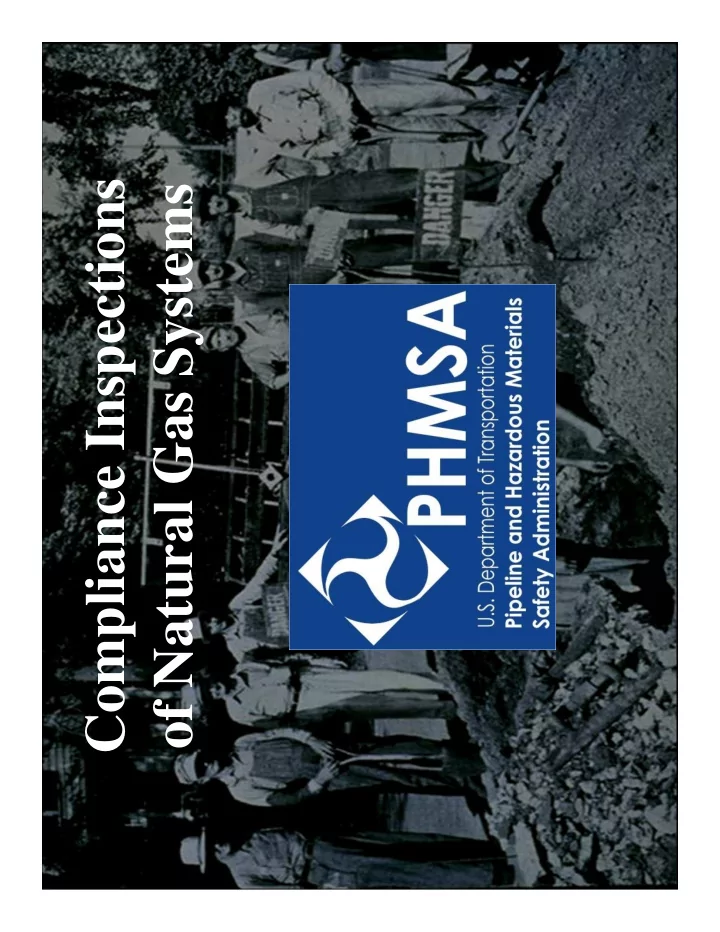

Compliance Inspections of Natural Gas Systems
Safety Regulations Applicable to Natural Gas Systems • Who are these people and why are they calling me? • Where do they get their authority?
Safety Regulations Applicable to Natural Gas Systems • The Minimum Federal Safety Standards Applicable to the Transportation of Natural Gas and for Pipeline Facilities Used for this Transportation, Are Found in Part 192, Title 49, of the Code of Federal Regulations.
Safety Regulations Applicable to Natural Gas Systems • Authority: Natural Gas Pipeline Act of 1968 (49 U.S.C. sec. 1671 et seq.) • Re-Authorized by the Pipeline Inspection, Protection, Enforcement, and Safety Act of 2006 (PIPES)
Part 190 Regulatory Authority §190.203 Inspections and Investigations. (a) Officers, employees, or agents authorized by the Associate Administrator for Pipeline Safety, PHMSA, upon presenting appropriate credentials, are authorized to enter upon, inspect, and examine, at reasonable times and in a reasonable manner, the records and properties of persons to the extent such records and properties are relevant to determining the compliance of such persons with the requirements of 49 U.S.C. 60101 et seq., or regulations, or orders issued there under.
Part 190 Regulatory Authority §190.203 Inspections and Investigations. (b) Inspections are ordinarily conducted pursuant to one of the following: (1) Routine scheduling by the Regional Director of the Region in which the facility is located; (2) A complaint received from a member of the public; (3) Information obtained from a previous inspection; (4) Report from a State agency participating in the Federal Program under 49 U.S.C. 60105; (5) Pipeline accident or incident; or (6) Whenever deemed appropriate by the Administrator, PHMSA or his designee.
How Do I Prepare for an Inspection? What do I do? Where do I begin? What do I look for? What’s the inspector going to look for?
What Type of Inspector Will I Get? What an inspector will focus on may vary depending on their personality, work background, or recent industry events. Let’s look at a few misconceptions about inspectors.
Different Types of Inspectors
Different Types of Inspectors
Different Types of Inspectors
Where Do I Begin? Think like an inspector. • Think about code requirements and not just company – requirements. Make sure you have current operator name, operator – official, address, and contact information. Make sure you have a complete, up-to-date operations – and maintenance manual. Does the manual have the right company information? • Does the manual have procedures and processes to instruct • someone how to safely perform operations and maintenance tasks your system, and do all employees have access to it? Does the manual have procedures for handling emergencies? • Emergency response procedures. – Actions directed toward people first. –
Where Do I Begin? Think like an inspector. • Make sure you have a complete and up-to-date operations – and maintenance manual. (Continued) Does your manual have procedures for reporting accidents / • incidents and safety related conditions? Make sure you have a complete and up-to-date damage – prevention plan. Make sure you have a complete and up-to-date public – awareness plan. Does your plan meet the requirements of API Standard 1162? • Make sure you have an up-to-date operator qualification – plan. Make sure you have an up-to-date drug and alcohol plan. –
Where Do I Begin? Think like an inspector. • Make sure you have all of the records required by the – code for your system. Make sure company records contain all code required – information for your system. Make sure records are complete and up-to-date. – What work was performed? (New Const., Repair, O&M Task) • Who performed the work? (Company or Contractor) (OQ) • When was the work performed? (Date & Time) • Where was the work performed? (System, Line Segment, • Station)
How Do I Go About It? Use the tools and inspector will use. • Use a current and up-to-date code book. – Some code books are only updated once a year and are • out of date when they are printed. Download the most current code book from the • PHMSA website. Use a federal inspection report sheet. – You can download a copy of any of the federal • inspection sheets from the PHMSA website. Standard, Specialized, Accident, and IMP inspection • sheets are all available on the website.
What Happens When the Inspection is Over? • The inspector will generally have a meeting with the operator to close out the inspection. • The inspector will go over their findings with the operator, and describe what is out of compliance with the code (if anything) and why. • The inspector will let the operator know what they might expect as a result of the inspection; letter of concern, warning letter, or violation letter.
What Happens When the Inspection is Over? • What the inspector lists as issues found in the audit may or may not be found in the final letter from the state program manager or PHMSA regional director. • The inspector is a fact finder and will make recommendations to their directors. • The enforcement authority lies with the state program manager or PHMSA regional director, and that’s who will send the letter.
Other Forms • Operator Annual Report Forms • Operator Incident Report Forms • Incident Investigation Inspection Forms • Operator Qualification Inspection Forms • Drug and Alcohol Program Inspection Forms • Integrity Management Inspection Forms • Construction Inspection Forms
Information Websites PHMSA Training and Qualification http://www.phmsa.dot.gov/pipeline/tq PHMSA Pipeline Safety Regulations http://www.phmsa.dot.gov/pipeline/tq/regs PHMSA Pipeline Safety Forms http://www.phmsa.dot.gov/pipeline/library/forms
Remember, We’re with the Government And We’re Here to Help!
Recommend
More recommend